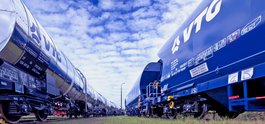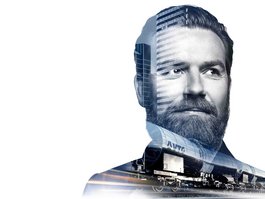Despite the massive global fallout from the Covid-19 crisis, VTG Aktiengesellschaft ended the first half of the 2020 financial year with solid results. Both revenue and EBITDA are roughly on a par with the previous year’s levels. Group revenue of EUR 605.8 million was actually 1.1% up on the same period a year ago (first half of 2019: EUR 599.3 million). This fact is attributable to the continuation of very stable wagon hire business and, in particular, to the repair shops owned by the VTG Group. Throughout the crisis, the latter have kept the wagon fleet operational without impairment, thus playing a major role in ensuring reliable supply lines. The transport volume in the logistics units was slightly down, above all due to Covid-19-related production outages. Despite this dip, the logistics divisions were able to underscore their critical importance to smooth-running supply chains again and again. Group EBITDA of EUR 245.8 million in the first half of 2020 was more or less unchanged from the previous year, edging down by just 0.5% (first half of 2019: EUR 247.0 million). Compared to the same period a year ago, fleet capacity utilization nevertheless fell by 2.2 percentage points to 90.8% (first half of 2019: 93.0%).
“The crisis surrounding Covid-19 was the main factor shaping the first half year at VTG, as at other companies. At the beginning of March, almost all of the VTG Group’s offices switched in a very short time to mobile working for their more than 1,000 staff, keeping business operations running smoothly into the summer. Where this strategy was not possible – in the repair shops and for engine drivers, for example – our staff applied strict hygiene measures and exhibited tremendous personal dedication to keep operations running, thereby helping to maintain reliable supply lines in Europe,” says Dr. Heiko Fischer, Chairman of the Executive Board of VTG AG. “The fact that we can report such positive first-half results in spite of these circumstances relates to a number of factors. In light of its infrastructural nature and its long-term orientation – especially in wagon hire activities – VTG’s business is much less vulnerable to crises than other business models.” Sound strategic decisions in recent years have also helped. Given that economic crises often affect VTG’s business only after a certain time lag, Fischer is well aware that the second half of the year will doubtless present further challenges. Yet he remains upbeat: “The way we have rigorously focused our wagon fleet on the future needs of the freight industry, ground-breaking digitalization, our forward-looking policy of internationalization and the ability to secure attractive, long-term funding will all benefit us at the long end of this phase.”



